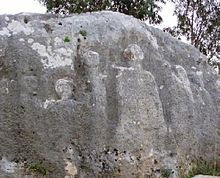- Cana
-
This article is about a place mentioned in the New Testament. For other uses, see Cana (disambiguation).
In the Christian New Testament, the Gospel of John refers a number of times to a town called Cana of Galilee.
Contents
The marriage at Cana
Among Christians and other students of the New Testament, Cana is best known as the place where, according to the Fourth Gospel, Jesus performed his first public miracle, the turning of a large quantity of water into wine at a wedding feast (John 2:1-11) when the wine provided by the bridegroom had run out (see Jars of Cana). Although none of the synoptic gospels records the event, mainstream Christian tradition holds that this is the first public miracle of Jesus.[1] However in John's gospel it has considerable symbolic importance: it is the first of the seven miraculous "signs" by which Jesus's divine status is attested, and around which the gospel is structured.
It is still a matter of discussion among theologians whether the story talks of an actual material transformation of water into wine, or is a spiritual allegory. Interpreted allegorically, the good news and hope implied by the story is in the words of the Governor of the Feast when he tasted the good wine, "Everyone serves the good wine first, and then the inferior wine after the guests have become drunk. But you have kept the good wine until now" (John 2:10, NRSV). This could be interpreted by saying simply that it is always darkest before the dawn, but good things are on the way. The more usual interpretation, however, is that this is a reference to the appearance of Jesus, whom the author of the Fourth Gospel regards as being himself the good wine.[2]
The story has had considerable importance in the development of Christian pastoral theology. The gospel account of Jesus being invited to a wedding, attending, and using his divine power to save the celebrations from disaster are taken as evidence of his approval for marriage and earthly celebrations, in contrast to the more austere views of Saint Paul as found, for example, in 1 Corinthians 7 [1]. It has also been used as an argument against Christian teetotalism.[3]
Other references to Cana
The other biblical references to Cana are in John 4:46, which mentions Jesus is visiting Cana when he is asked to heal the son of a royal official at Capernaum; and John 21:2, where it is mentioned that the apostle Nathanael (usually identified with the Bartholomew included in the synoptic gospels' lists of apostles) comes from Cana. Cana of Galilee is not mentioned in any other book of the Bible, nor in any other contemporary source.
Locating Cana
There has been much speculation about where Cana might have been. In his Gospel, the author makes no claim to have been at the wedding himself. Some Christians regard the story of the wedding at Cana as having more theological than historical or topographical significance, but most do not. Likewise, some (but not all) modern scholars hold that the Fourth Gospel was addressed to a group of Jewish Christians, and, very possibly, a group living in Judea.
There are four villages in Galilee which are candidates for biblical Cana:
According to the Catholic Encyclopedia of 1914, a tradition dating back to the 8th century identifies Cana with the modern Arab town of Kafr Kanna, about 7 km northeast of Nazareth, Israel. However more recent scholars have suggested alternatives, including the ruined village of Kenet-el-Jalil (also known as Khirbet Kana), about 9 km further north, and Ain Kana, which is closer to Nazareth and considered by some to be a better candidate on etymological grounds. The village of Qana, in southern Lebanon, is another candidate for the location. Many Lebanese, Christians and Muslims, believe the village to be the correct site. This is not a matter on which certainty is ever likely to be achieved.
References
- ^ Towner, W. S. (1996). Wedding. In P. J. Achtermeier (Ed.), Harper Collins Bible dictionary (pp. 1205-1206). San Francisco: Harper
- ^ e.g. Smith, D. M. (1988). John. In Mays, J. L. (Ed.), Harper's bible commentary (pp. 1044-1076). San Francisco: Harper.
- ^ e.g. Geisler, N. L. (1982), A Christian Perspective on Wine-Drinking. Bibliotheca Sacra, 49
External links
- John 2 in the New Revised Standard Version of the Bible
- Comprehensive list of online resources and references relating to John 2:1-11 at The Text This Week
- Entry on Cana in the Catholic Encyclopedia of 1913
- Entry on Cana in Easton's Bible Dictionary (1897)
Categories:- New Testament places
Wikimedia Foundation. 2010.


